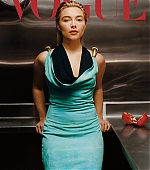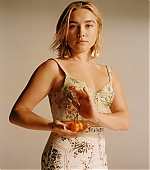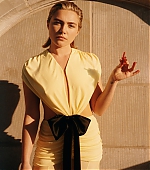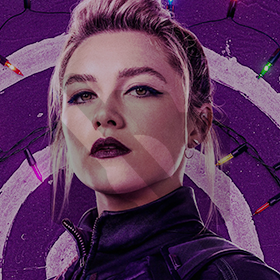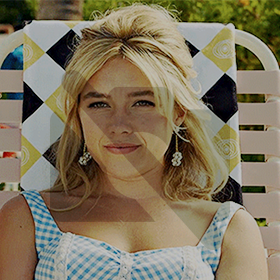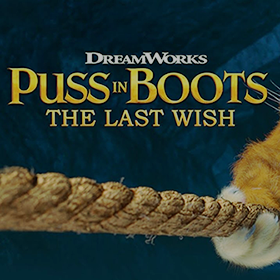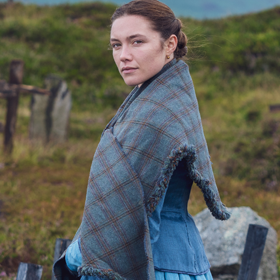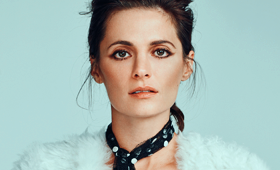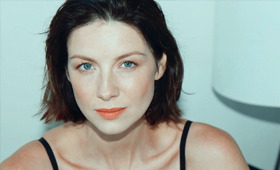Florence Pugh is Vogue’s Winter Cover
- January 13th, 2023
- Florence Pugh, Gallery Update, Highlight, Interview
Florence Pugh is Vogue Magazine’s Winter Cover issue. Check out her interview and photos below:
“D oes anyone else want one?” Florence Pugh calls out from behind the kitchen island where she has been mixing martinis. She is dressed a little absurdly, and very formally, for a kitchen, in a clinging vermilion Alexander McQueen dress and heels—an ensemble she has put on for the sake of a Vogue video crew that is having her demonstrate some of her favorite recipes: a vodka martini with a twist in a chilled glass and a cherry tomato crostini with lots of garlic and a bit of chopped chile pepper. She has made sure to cut up the baguette before she gets started on the drinks (not her preferred sequencing) so that the slices have a chance to toast in the oven. The flat of the carving knife descends on a clove of garlic; it doesn’t stand a chance. A rogue cherry tomato rolls off the cutting board; she leans over the counter and spears it with the tip of her knife. This is a woman at home in a kitchen, even one illuminated by set lights and framed by a boom mic.
Pugh at 26 is the kind of actor—thrillingly talented, coming off a series of stunning performances, and with compelling projects ahead of her—who is not just supremely comfortable in her skin, but also charmingly game. Perhaps it’s more precise to say she is the kind of person who exudes a let’s-go gameness. Give her a cocktail to make and she will fix you one too. If the cooking demo films through lunch, she’ll make sure the entire room gets a taste of what she’s making.
“Anyone?” she asks, offering the martini again. I slip outside the room for a moment, and when I return, a few chilled glasses have found their way into the hands of those on the other side of the camera. When the video wraps, she changes into black jeans, chunky Naked Wolfe boots, and a white T-shirt with an image of a grinning tongue-out mouth at the breast—a bit of Bon Iver merch she’s had for years. She is about to depart when she realizes she hasn’t sufficiently thanked the crew. “Thank you, thank you,” she says, rushing back in.
The skies are ominous, but our destination is fortunately indoors: a Brooklyn weaving studio called Loop of the Loom where we can indulge in a different type of hands-on creativity. There we will be instructed in the art of Saori, a weaving style founded by a midcentury Japanese housewife that embraces the imperfections of cloth made by hand. The idea is to let our instincts lead us, and emerge, perhaps, slightly more enlightened, with appreciation for all that makes us unique. “After one hour,” the owner, Yukako, had told me, “you will be a new person.”
Yukako had also told me that we will be joined by two girls who come to the dojo almost every day after school—she doesn’t have the heart to cancel on them. Sure enough, when we arrive at the glass-fronted space, next to graffiti-covered buildings on an unassuming stretch of Dumbo’s cobblestone streets, our preteen friends are seated at their looms. “Hello,” Pugh says brightly, making a beeline for the closest one. In full makeup (leftover from the shoot), her hair in a wavy shoulder-length bob, she cuts a glamorous figure, even dressed in her low-key jeans and T-shirt. “What are you making?”
Once we are settled in a car, rounding the southern tip of Manhattan on the FDR Drive, she confides that she’s never cooked without music—Kate Bush, Spanish musician Rita Payés, Glass Animals—the volume on full blast. “When I do ‘Cooking With Flo’ ”—the friendly, improvisational cooking demonstrations she has posted on Instagram for the past few years—“I just have a fun time,” she says, laughing. “I’ve never done it with, like, 25 people looking at me, saying, ‘Do the thing!’ ”
“They have been here for hours,” Yukako says with amused apology—it’s a school holiday and the girls have settled in for the day; a grayscale creation spills from one of their looms onto the pale wood floor. Against the whitewashed wall there are hundreds of spools of yarn, a rainbow of silken and woolen threads. The whole dojo has the feel of a hushed and brightly lit art gallery, with a wall of windows facing a street that is currently being whipped by the rain.
“It’s a poncho,” the girl tells Pugh. The other has made a jewel-toned lumbar pillow that she proudly holds in front of her. True New Yorkers, the girls don’t acknowledge if the woman taking a genuine interest in their work reminds them of a Marvel superhero or if they recognize her from the Don’t Worry Darling posters that have covered buses and subway stations for months.
“You’re inspiring me,” Pugh says. “I need to learn from you guys. How long did this take you to make?”
“Two…three hours,” the girl says shyly.
“I thought you were gonna say two, three weeks!” Pugh exclaims.
Yukako ushers us to the looms she has set up and shows us how to thread the yarn back and forth, moving our feet—“like walking”—on the pedals. “It’s okay to make a mistake,” she says. “Mistake is your design. You can accept your mistake.”
But Pugh is as at ease with the bobbin as she was in the kitchen, and a length of pink-and-pale-blue cloth that looks like a Southwestern sunset, segmented with strands of sequins and strips of braided felt, quickly issues from her loom. “I was trying to think of what I like best in bougie pillows, and it’s all the random bits,” she says, pointing at the seemingly errant but artfully arranged threads.
The minutes tick by. The loom has a hold on us. The girls put on their raincoats and gather their backpacks as they get ready to depart, heading out into the now dark city. “I’m so jealous of those two,” Pugh says quietly, once they’ve left. “Imagine how much happier you’d be if you’d been doing this since you were very young. You’d have something for when you feel stressed out.”
She tells Yukako that she is ready to remove her creation from the loom, and the owner comes over to inspect her weaving: “It’s like graphic design,” Yukako exclaims, “you are like an artist.”
Pugh grew up in a house of artists, even if its occupants hadn’t yet officially declared it their profession. Her father owned (and owns) restaurants, while her mother was a classically trained ballet dancer who became an aerobics instructor, traveling around England teaching classes in her thong leotard and Lycra tights. Her father met her mother in one of these classes, and the two settled down in Oxfordshire, where he established a small empire of eateries—an eclectic range of establishments, pulling from Mexican, Moroccan, Spanish, and other influences. Arabella (now an actor and voice coach) was the first child to be born, then Sebastian (actor and musician), then Florence, who would eventually be followed by Rafaela, or Mole, as the family called her because of the way her hands crept over the covers when she was sleeping—“like a little mole,” Pugh tells me. (Mole, 19, is interested in costume design.) It was a loud, boisterous, love-filled house—the children spread out over 18 years, but not so distant that it stopped them from teasing one another. “My siblings are just as big in my life as my parents,” Pugh tells me. “The best sign of a good person is the ability to laugh at yourself. And siblings were crucial for that. With the job that I do, it’s so important to have people who are gonna say, ‘Hey, I know you didn’t mean it, but you were being a bit of a muppet.’ ”
When Pugh was three, the family moved to an international enclave in southern Spain, near Gibraltar, partly for the adventure, partly for the weather, which the family thought might help with her tracheomalacia, or “floppy trachea,” a condition that had made Pugh something of a sickly child. She was in and out of the hospital when she was a baby, though she is adamant that this didn’t define her. “I never want this to be a sob story,” she tells me, “because it’s never been a story in my life.” In Spain the family lived near the ocean, and their lives were guided by an easy rhythm of cycling to school, cycling to the beach, cycling to their friends’ houses.
Her parents designed their lives to preserve their children’s innocence, and the effects of their unselfconscious childhood—“we were always naked as kids,” Pugh says—have reverberated through her adult years. “We are human, we are bodies,” she says. “Yes, I can put makeup on and look good for a premiere. But at the end of the day, I still have hair on the top of my lip and I still smell after a workout and I still get spots when I’m stressed. I think that attitude definitely has trickled down from when I was a child.”
Pugh’s radical self-acceptance played out publicly last year, when she wore a series of transparent outfits and seemed to welcome the small furor that followed. “I’ve never been scared of what’s underneath the fabric,” she tells me. “If I’m happy in it, then I’m gonna wear it. Of course, I don’t want to offend people, but I think my point is: How can my nipples offend you that much?” She describes to me the gruesome and abusive comments a proud post of her in a sheer Valentino dress elicited, but explains that such trolling offers motivation more than deterrent. For all of her geniality, there is a steely core to Pugh that welcomes confrontation on the matters she deems worthwhile. “It’s very important that we do this. I know that some people might scoff at me saying that, but if a dress with my breasts peeking through is encouraging people to say, ‘Well, if you were to get raped, you would deserve it,’ it just shows me that there’s so much more work to do.”
She will suffer no nonsense when it comes to debates over women’s bodies. She will, in fact, make it her mission to underline how damaging such nonsense can be, how sexist and how distracting toward her careful—mental and physical—work. “I’m never losing weight to look fantastic for a role,” Pugh says. “It’s more like: How would this character have lived? What would she be eating?”
Pugh’s family moved back to Oxfordshire when she was six, which caused something of a rude awakening for Pugh when she was told she was no longer permitted to roam freely—“What do you mean someone might steal me? It was a bit of a cold breath.” But the vibrant family life continued: “Dad would get clay; we were constantly making and drawing things.” The kids took turns posing in funny positions for family sketching nights. Christmas was a work of art in itself, a “major deal,” as she puts it. When Mole was born, Pugh became a surrogate mother. “She was as much my baby as she was my mum’s,” Pugh says. “I’d wake up early in the mornings on the weekend to go and collect her from her cot. And my parents would have a lie-in, and I’d make her a bottle and we’d watch Friends together.” When she was a bit older, Pugh, like all her siblings, worked in her father’s restaurants, making cappuccinos and, when she was legal, pouring drinks. (“There’s an enormous amount of power when you’re behind a bar.”) Pugh was, by her own admission, not especially academic, though she was chummy with all her teachers and became very close with her fellow student actors, several of whom are still her dearest friends: “We were very loud and very dramatic.”
When she was 16, Pugh was urged by her mother to try out for a film that was holding open auditions in the area. Set in a repressive girls school in the late 1960s, Carol Morley’s The Falling (2014) would offer Pugh the role that would galvanize her extraordinary ascent. In it, she plays Abbie, the charismatic focal point of a group of close-knit teenage girls, and the first affected by an episode of collective hysteria. When Pugh left the audition, Morley recalls the casting agents falling into silence. “I asked them, ‘What’s the matter? Did you not think she was amazing?’ They said to me: ‘We’ve got goosebumps. That was like discovering a young Kate Winslet.’ ”
Even as a teenage newcomer, Pugh had an impact on the way the film was made. Once Morley, who speaks of the actor with a proud, maternal perspective, discovered that Pugh had recorded a series of sweet YouTube ballads from her bedroom as “Flossie Rose,” she made Abbie a musician. When the film came out, much of the press circled Pugh’s costar, the more famous Maisie Williams, and so Morley and Pugh did interviews together and became genuine friends.
That friendship—and the protected, warm experience of The Falling—would offer important perspective to Pugh a few years later when she filmed a pilot for a show called Studio City in LA, and found herself—particularly her body—the subject of far less kind scrutiny. Nineteen at the time, and not yet the woman who would proudly reveal herself on a red carpet and gleefully rebuff detractors, Pugh felt the sharp edge of this criticism. “I didn’t want to take away her experience or minimize it,” says Morley of her talks with Pugh after the spell in LA. “I just kept reinforcing the fact that it didn’t have to be that way. That it was unacceptable treatment. I didn’t know the circumstances, but I knew it had traumatized her. For me it was about making sure that she understood that it wasn’t the whole picture.”
That whole, expansive picture would become clearer to Pugh through the series of demanding, intelligent roles she was able to take in part because the pilot was not picked up. First came Lady Macbeth (2016), in which she played a very sympathetic 19th-century murderer (not that Lady Macbeth, but one with similarly dubious moral grounding)—a role that, happily, she says, let her be nude exactly the way she wanted her body to be. Then she played Cordelia in a TV film of King Lear (2018) starring Anthony Hopkins, followed by the lead in Ari Aster’s highsummer Scandi-set thriller, Midsommar (2019), in which she once again made a murderer (albeit an inadvertent one) eminently likable. All this before she accomplished the similarly impressive feat of turning Amy, the most annoying of the March sisters, into the most appealing in Greta Gerwig’s Little Women (2019)—that role earned her a best supporting actress Oscar nomination. Then, of course, the Marvel machine enveloped her, setting her alongside Scarlett Johansson as Johansson’s younger sister in Black Widow.
Last year, she starred, alongside Harry Styles, in Olivia Wilde’s ill-fated Don’t Worry Darling—an experience about which perhaps the less said the better, given the volume of uncharitable speculation that has attached itself to the film. Pugh certainly doesn’t want to discuss any of it, and though she doesn’t frame it this way to me, it’s easy to imagine that the Don’t Worry Darling meta-commentary would fall for her into the same category of nonsense as anonymous men commenting on her breasts.
Rather, today she is focused on The Wonder, an experimental jewel from the Chilean director Sebastián Lelio, currently on Netflix. The Wonder is an elegant oddity of a film—a slow-burn thriller set in 19th-century Ireland with postmodern casing—and yet it has found devoted admirers. In it, Pugh plays a nurse attempting to get to the bottom of a mystery, seen by some as a miracle. “Florence has the capacity to make her thoughts palpable,” says Lelio. “And that really is a cinematic effect.”
It’s an extraordinary rise through a series of complicated, layered roles, and all the more impressive for an actor who has never studied professionally. And yet Pugh is modest about her success: “Every single version of getting into this industry is a fluke,” says Pugh. “Because there are no guarantees—in any way.”
Next up is our dinner reservation at nearby Vinegar Hill House. Our cautious driver attempts to navigate the neighborhood’s potholed streets while Pugh applies Valentino lipstick in the back seat. “Accidental reds are really powerful,” she says, unfazed by the jostling, “because you can get away with wearing them during the day. And not everyone is like, Oh, wow. It’s a bit like wearing a beret,” she says, laughing. “You really have to nail it.”
The restaurant isn’t quite ready for us, so we head for a drink next door at Cafe Gitane. Pugh is unflustered by the change in plans, not even when I accidentally open my umbrella dangerously close to her eyes—“That would be a dramatic and abrupt end to your piece!” she laughs. Once seated, she spots a wrought-metal gate separating the kitchen from the dining area. “My dad used to collect things like that,” she tells me. “We used to have warehouses of them. And so now that I’m doing up my place, I’m like, Hey Dad, do you still have that bar….” Pugh has recently bought a place in London, the first she will call home in the city she has always thought of as home. “For years, because I was so busy, it made no sense for me to rent a place in London because I was barely ever coming home. I was always literally going from one job to the other, living in a suitcase,” she says. “When I’d come back, I’d only wanna see my family and my friends anyway. So I’d just stay with family and friends.”
Over the past few years she has lived in LA more than anywhere else, but has always thought of herself as “more of a London girl.” Now that she is a proper London girl, she’s taking special care with her new kitchen, designing it with copper surfaces and stone floors. She chose South London because it’s where several of her friends from secondary school live. “You know, you have a daydream when you start out: What is it that means you’ve made it? What is it that means you are an adult? And for me it was: You live close to your friends and you have a local pub. And because I didn’t do that when I was young, because I didn’t go to university, it meant that for all of my adult years of working and my adult years living abroad, I still, in my mind, hadn’t got all the pieces together.”
There was a time, not long ago, when Pugh did, at least to outside observers, seem to have the pieces together. For several years, until some point in 2022, she was in a relationship with the actor and director Zach Braff; she still calls the kitchen of the LA house she lived in with him “her kitchen,” the garden “her garden.” “It’s all very new,” she says when I ask her if she’s keeping a place in LA. “My breakup has been very new, so I’m figuring that out.”
Pugh and Braff met through friends, but became closer when he cast her in a short film he was making for Adobe—a souped-up piece of semi-sponsored content, starring Alicia Silverstone alongside Pugh as a disaffected 18th-century social media star. (It is both absurd and amusing.) Pugh and Braff were a private couple, but occasionally shared an Instagram post at Disneyland, a birthday toast. Despite the innocuous and seemingly grounded nature of their relationship, they came in for no small part of criticism because of their 21-year age difference—a nasty experience that has clearly stayed with Pugh as a depressing corollary of being in the public eye. “We weren’t in anyone’s faces. It was just that people didn’t like it,” she says. “They imagined me with someone younger and someone in blockbusters. I think young relationships in Hollywood are so easily twisted because they add to the gossip sites. It’s exciting to watch. And I think I was in a relationship that didn’t do any of that.”
When the pandemic began, they—like everyone—bunkered down, making pizza in an Ooni oven, composing music, dancing in the house. Except the horror of the pandemic was literally at their doorstep as well. Braff’s best friend, the actor and singer Nick Cordero, had moved into Braff’s guesthouse with his wife and baby son just before falling ill with COVID, which would eventually lead to his death. Cordero’s wife, Amanda Kloots, would heartbreakingly document her husband’s struggle—for many, he was an early example of a prominent, healthy young man falling victim to the plague.
“Our property became ground zero for Amanda,” says Braff when I speak to him over Zoom from his house in LA. “So many amazing human beings came by, and they’d walk her baby so she could just have an hour of solitude. Florence would make pizzas and bring them down to her. And we were afraid of COVID, of course. So she would sit on the front stoop and we would sit on a bench six feet away. It was a very, very, very intense time, and we couldn’t even properly comfort Amanda. Of course, we broke down and just said, fuck it, and hugged her.” Nick was the one, says Pugh, who “made everyone feel good—in terms of my relationship to that friendship group and that life, Nick was such a massive part of it.” Cordero’s memorial would be held in Braff’s vegetable garden; Cynthia Erivo, who Cordero admired but who he had never met, came to sing in tribute to him.
The tragedy of Cordero’s death, as well as the deaths of Braff’s father and his sister, prompted him to start thinking about the next film he wanted to write—a project that eventually became A Good Person, which stars Pugh and is out in March. The story, as Braff describes it, was partly inspired by Kloots: “I really wanted to write about how we as humans, no matter how hard things get, stand back up.” But it was also explicitly written for Pugh. “I quite simply think she’s one of the greatest actors of her generation,” he says. “She’s just magnetic. You cannot take your eyes off of her. And it’s not just her beauty and it’s not just her acting ability, it’s that thing, that magic thing that transcends the screen, where anyone and everyone goes: I want to see whatever this person does.” (Morley had echoed this: “I believe she’s a Meryl Streep. She will have a career for the rest of her life.”)
In A Good Person, Pugh stars as Allison, a young pharmaceutical saleswoman on the cusp of getting married who is involved in a terrible accident that kills two members of her fiancé’s family. Opioids are prescribed to aid her recovery, and the pills become a crutch and then an addiction. It is a film about disease and pain, but also family and making a home. Pugh is a producer on the film and participated in the casting, revising the script, and writing music that she (as Allison) would perform onscreen.
At one point, Pugh had the notion that Allison should cut her own hair as part of a desperate attempt to puncture the fog of depression. This was an idea that came to Pugh from her own on-and-off experience as a teenager experiencing both routine and occasionally acute mental distress. “So many of the things that I did were quick fixes,” she says. “Things were so wrong in my head and things were so wrong with school life and things were so dark and scary. And so I would try and do quick things like, Oh, well, I can change my nails. Oh, I can buy an eyelash kit. I can buy this weird cellulite cream on Amazon.”
She raised the idea of cutting her hair to Braff, who told her that that kind of irreversible alteration would mean that there could be no filming scenes out of order—impossible, especially on their very tight indie film budget. “Probably three times, I was like: ‘Florence, it’s such a good idea. Here’s why it’s impossible.’ And she was like: ‘You guys will figure it out.’ And then eventually we did.” The haircut that Pugh gives herself on camera is, as she puts it, “a mistake that she has to wear on her head for the entire film. I just wanted it to be a dreadful mess.” That hair—so bad I had assumed it was a wig—is just one more example of her devotion to her work. “Florence isn’t afraid to sit in the choices she’s made for her characters,” says Scarlett Johansson, her costar in Black Widow. “She commits to the idea of a multifaceted and complex person with all their stubbornness and flaws. It’s one of the many qualities that makes her so delicious to watch.”
Without giving too much away, what jolts Allison out of her stupor is not a haircut but an encounter with her (by then) ex-fiancé’s father, played by Morgan Freeman. The two become an odd couple, simultaneously repulsed and bound together by the tragedy they have endured. Their communion is halting and painful, but the film delivers an ultimately hopeful message about the power of redemption, which feels a fitting theme given Pugh’s clear connection with almost everyone she encounters, from her directors to her ex-partners to tweens in a weaving studio to waiters offering her wine.
When I speak with Lelio, he elaborates on her magnetism, her ability to make those around her feel special and valued. “One day, while we were filming The Wonder, we were informed that there was a truck with doughnuts outside as a little present from Florence to the team.” Her off-camera role on the film went beyond providing baked goods. “Filmmaking can be exhausting,” Lelio says. “You get to see who everyone is, because you’re under a lot of pressure. Florence had that way of uniting everyone and uplifting the set.”
(A digression on Pugh’s charisma that is too good to elide: When she was making Park Chan-wook’s TV adaptation of John le Carré’s The Little Drummer Girl (2018), she sat down for a dinner with the author toward the end of the filming, and le Carré said something about women and money that she found a bit silly and a bit offensive. “I looked at him and I said, ‘You’re such an old fart,’ ” Pugh relates. “And he said, ‘Excuse me?’ And I said, ‘You’re such an old fucking fart.’ And he paused in his story and gave me a wry smile. And then he leaned in and he said, ‘I think we’re going to get along just fine.’ And then after that we were best friends.” A year later, Pugh saw him again, and he confessed to some near-fatal writer’s block. “I said, ‘What do you mean your writing days are over? Just keep writing. Keep stretching your brain. Do it.’ ” At their next encounter, on the red carpet, she gave him a big hug. “He goes, ‘Florence, Florence. Guess what? I’m writing again!’ I was like, ‘Oh, my God, that’s amazing.’ And he goes, ‘That’s not even the best bit. You’re in my book.’ ” The “Florence” of le Carré’s penultimate novel—the author passed away in 2020—Agent Running in the Field, is a talented but occasionally insubordinate young spy with a penchant for red Burgundy.)
As for what’s next: When Pugh departs New York, she will be back in press mode for The Wonder, then waiting for her big projects of 2023 to come out: Christopher Nolan’s Oppenheimer (scheduled for July), in which she plays Jean Tatlock, the mistress of the titular atomic scientist (Cillian Murphy), and Denis Villeneuve’s Dune: Part Two (slated for November). Then it’s off to Atlanta to film her next Marvel project, Thunderbolts; meanwhile, she’s conspiring with her Little Drummer costar Alexander Skarsgård (coincidentally, she had breakfast with him the same morning as our weaving exploits and dinner) to make a film that he will direct called The Pack, about a documentary film crew attempting to save a species of wolves from extinction. Farther out, she would love to do theater, though it is both an attractive and a terrifying prospect: “Being onstage is a different thing, because you’re in front of people who need to be entertained now.… And I know that when I do a play, it’s going to mean a different thing. Whereas if I’d done it five years ago, not as many people would’ve come. I suppose the more time that I’ve avoided it, the more the pressure builds.”
With the holiday season approaching, she has babies to visit—she is heading to her friends’ home for Thanksgiving a few weeks later to meet their infant. She will spend Christmas with family, including her one-year-old niece, Aurora, who Pugh calls Rory or Figgy (because at one point in utero she was approximately the size of a fig, and while the Pughs like big names, they also know when a baby needs a nickname). Pugh herself once thought she would have 10 children; she feels babies are definitely in her future. If she gets a moment to take a vacation (seems unlikely), she may go back to Italy, where she traveled this past summer, or join her Gran—an accidental star of the Venice Film Festival red carpet, when Pugh brought her along as her date—for hiking in the Lake District. “Seven hours going up and seven hours coming down,” she says. “We’ve all been doing that with her since we were about 11.” And of course there is a kitchen to finish back in London, waiting for an inaugural dinner party.
Over the course of our own meal, we have navigated our way through chicken liver mousse, a roast chicken, a bowl of rigatoni with lamb ragù, a salad with strangely delicious smoked grapes on top. “Maybe we ordered too much?” Pugh wonders as we start to lose stamina and a trout dish remains untouched. She insists I take it home for my mother, who is watching my children, happy that the tragedy of wasted food has been averted. When we emerge from the restaurant, the rain has stopped, and the streets are slick and strangely warm for a fall evening. This corner of Vinegar Hill is dark and misty, somehow left behind in the condo-crazed land grab that has transformed the Brooklyn waterfront. Pugh gets in a car that will take her back to Manhattan, where she is meeting the actor Ashley Park—who happens to be in town—another friend she has collected in her travels, in her work. Pugh may not yet have a local pub filled with her childhood mates, but if what turns a house into a home is the love with which you fill it, it is clear that she will have a home wherever she makes it.

